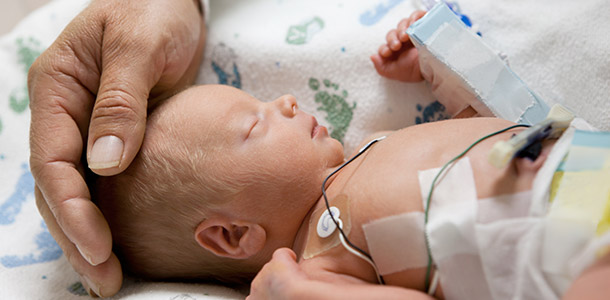Care for High-Risk Babies
Although most parents are able to bring their newborns home within a day or two after birth, some infants may be born prematurely or may have needs and conditions that require additional, specialized medical care.
When this occurs, the Level III Neonatal Intensive Care Unit (NICU) at Centennial Hills Hospital Medical Center is ready to provide the care they need. The Level III NICU is equipped with advanced medical technology required for a wide range of conditions, including babies born a few weeks prematurely, unstable babies and those born with low birth weights.
Caring for Premature Babies
Centennial Hills Hospital treats babies who are as young as 23 weeks gestational age. In addition, our Level III NICU is designed to provide care for babies with a variety of respiratory and infectious conditions. It is equipped with advanced respiratory technology such as ventilators and continuous positive airway pressure (CPAP) systems.
Staff in the Level III nursery care for specialized surgical, cardiac and neurological conditions. Our staff includes neonatologists, registered nurses, respiratory therapists, occupational and physical therapists, social workers and breastfeeding specialists, all specially trained to work with infants in the NICU. Your baby's care team will coordinate any necessary consultations with other specialists, including ophthalmologists, surgeons and pulmonologists.
NICU Expansion
The Neonatal Intensive Care Unit (NICU) has been expanded from 15 to 25 beds.
Specialty Equipment for High-Risk Infants
The Level III NICU at Centennial Hills Hospital has specialty equipment designed for high-risk infants, including:
- Cardiac monitors to ensure that heartbeats are at the correct speed and rhythm
- Respiratory monitors to measure breathing rates and patterns
- Pulse oximeters to check oxygen levels in the blood
- Intravenous (IV) and peripherally inserted central catheter (PICC) lines to administer medications
- Umbilical catheters to monitor fluids and for lab tests
- Feeding tubes for babies who are too sick or premature to eat
- Phototherapy for babies who have jaundice*
- Respiratory equipment, such as nasal cannulas, CPAP, non-invasive mechanical ventilation and ventilators
- Advanced ventilation equipment, which can include jet, high frequency oscillation and nitric oxide therapy.
*Jaundice, while not uncommon in newborns, can lead to permanent and disabling health consequences when not diagnosed and treated promptly. Contact your pediatrician immediately if you notice yellowing of your infant's skin or eyes.
Family-Centered Care
The NICU staff at Centennial Hills Hospital promotes family-centered care such as:
- Skin-to-skin care with babies and parents
- Breastfeeding support for mothers and developmental care for babies
- Clustered care and minimal handling to help babies receive uninterrupted periods of sleep.
Special Care for Your Baby's Needs
The Level III NICU offers the following special care and services:
- Neonatalogist coverage 24 hours a day, seven days per week
- Giraffe Omnibeds that serve as both an incubator and radiant warmer with rotating mattress, built-in humidifier and built-in scale
- A nurse to baby ratio that meets the American College of Obstetricians and Gynecologists (ACOG) guidelines, and based on each baby's needs
- Dedicated waiting area for NICU parents
- Overnight accommodations for parents prior to their baby's discharge, as available
- Flexible visiting hours.
NICVIEW® 2 Video-Streaming Technology
To further help parents and other family members engage in their baby’s care, the Birthplace at Centennial Hills Hospital uses the NICVIEW® 2 web camera system, a video-streaming technology that is clipped to the baby’s bedside, giving parents and other family members the ability to watch their baby’s care and activities. It also helps the family learn their newborn’s routines within the NICU, which can help smooth the transition to life at home.
The technology uses web-based video with real-time streaming on any online device or via an iOS or Android app. It features password-protected access so parents and family will only view their own child.

